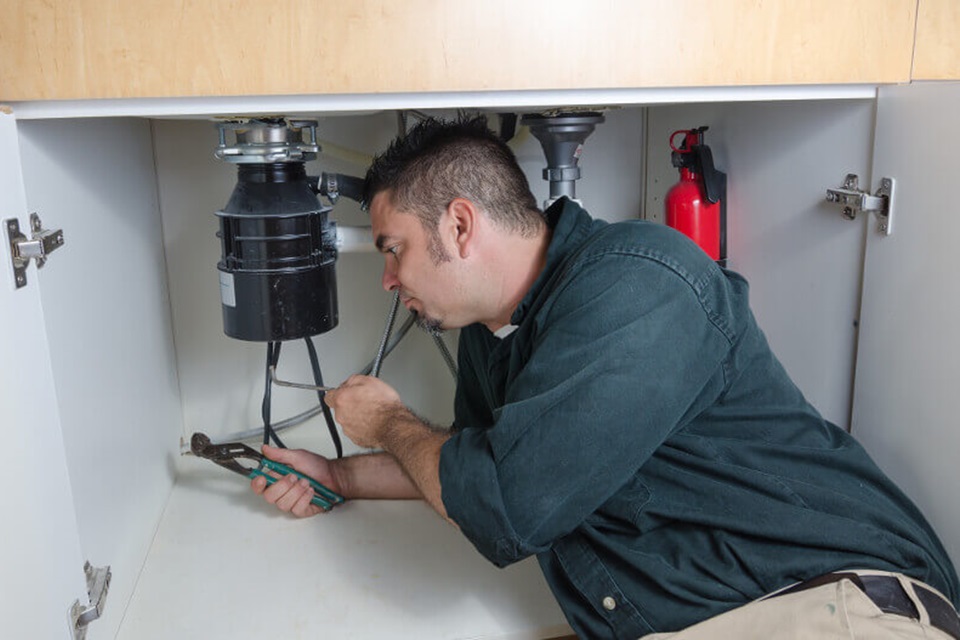Garbage disposals are vital in modern kitchens, streamlining waste management and keeping sinks free from food debris. Regular care is necessary to ensure these appliances run smoothly and prevent breakdowns. This expanded guide offers ten easy-to-follow tips for maintaining the efficiency and longevity of your garbage disposal, helping you avoid common pitfalls that lead to repairs and issues like garbage disposal rust.
1. Run Cold Water During & After Use
Always run cold water when using the garbage disposal, as it solidifies food residues and fats for more effective grinding. Continue running the water for about 15 seconds after turning off the disposal to make sure all particles are flushed through. This practice also helps reduce wear on the motor, contributing to the disposal’s overall longevity.
2. Gradual Disposal Of Waste
Feed waste gradually into the disposal instead of overloading it with large amounts at once to prevent jamming and overworking the motor. This approach reduces the risk of breakdowns and ensures more efficient grinding and disposal of food waste, keeping your kitchen hygienic and odor-free.
3. Avoid Hard & Fibrous Materials
Avoid disposing of hard items like bones or fruit pits and fibrous materials like celery stalks or corn husks, as they can blunt blades or jam the disposal. By being mindful of what goes into the disposal, you can maintain its efficiency and prevent damage to the grinding mechanism.
4. Regular Cleaning Is Crucial
Regular cleaning, involving ice cubes and citrus peels, maintains hygiene and prevents odor build-up. This process not only sharpens the blades and freshens the unit but also helps prevent garbage disposal rust, ensuring the long-term health of the disposal system.
5. Use Dish Soap Sparingly
While running soapy water through the disposal is fine, avoid using excess dish soap. Excessive suds can lead to residue build-up, impairing the disposal’s performance, and may also necessitate more frequent deep cleaning to maintain optimal functionality.
6. Cut Large Items Into Smaller Pieces
Before disposing of large waste items, cut them into smaller pieces to decrease strain on the motor and blades. This simple step prevents clogs and jams and enhances the grinding process, ensuring a smoother operation of the disposal unit.
7. Avoid Expanding Foods & Starchy Substances
Avoid disposing of expanding foods like pasta and rice and starchy substances like potato peels, as they can create clogs. By being cautious about what goes into the disposal, you can prevent sticky or bulky blockages that can be challenging to clear and might require professional help.
8. Regularly Check For Leaks & Loose Parts
Inspect your garbage disposal regularly for leaks or loose parts. Early detection and repair of these problems can prevent more significant problems, safeguarding the disposal’s integrity and functionality.
9. Avoid Chemical Drain Cleaners
Steer clear of chemical drain cleaners, as they can corrode the disposal’s metal parts. For clogs, use natural solutions or a plunger; if these don’t work, professional help is advisable. Avoiding harsh chemicals will preserve the disposal’s components and ensure its safe operation.
10. Professional Maintenance & Repairs
Seek professional assistance for persistent issues or annual maintenance. Professional maintenance can identify potential problems early, preventing them from escalating and ensuring that your disposal continues to operate at its best.
Conclusion
Properly caring for your garbage disposal can significantly prevent inconvenient breakdowns and expensive repairs. By following these expanded tips, you can ensure efficient and hygienic kitchen operations. Regular upkeep and mindful usage are key to the longevity and usefulness of garbage disposal.







No Comments